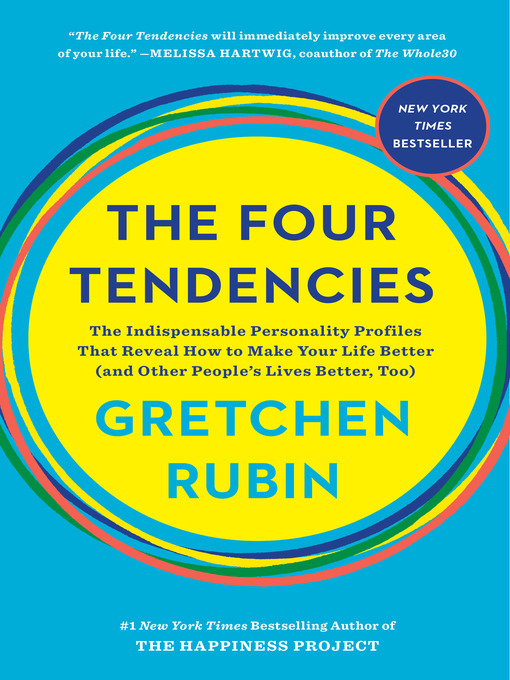
The Four Tendencies
The Indispensable Personality Profiles That Reveal How to Make Your Life Better (and Other People's Lives Better, Too)
کتاب های مرتبط
- اطلاعات
- نقد و بررسی
- دیدگاه کاربران
نقد و بررسی

July 3, 2017
Rubin (The Happiness Project) sorts personalities into four “tendencies”—upholders, questioners, obligers, and rebels—according to people’s motivations for undertaking actions in this breezy but unconvincing work of pop psychology. Each tendency gets two separate chapters devoted to understanding and dealing with people with a specific trait. There’s even a Venn diagram and brief, if arbitrary, quiz. The simplicity of the profiles is comforting, but the science is questionable. The author commissioned a survey and uses anecdotal evidence to bolster the framework’s worth, but her attempts to find proof smack of confirmation bias. The author diagnoses her friends and social-media followers using her framework, sometimes sounding wise, at other times smug. Supposedly there’s no hierarchy to the tendencies, but the author, an upholder, can’t quite hide her preference for her own tendency, with her husband’s questioner tendency running a near second. Even the author admits that personality frameworks can’t “capture human nature in all of its depth and variety,” but nevertheless argues for utilizing her ideas to improve one’s life. In its best moments, the book reminds readers that not everyone approaches the world from the same perspective. Agent: Christy Fletcher, Fletcher and Co.

July 15, 2017
An exploration of human behavior patterns as viewed through the lens of four specific tendencies.With data garnered from more than 600,000 participants in her online quiz, bestselling self-help author Rubin (Better Than Before: Mastering the Habits of Our Everyday Lives, 2015, etc.) contends that when individuals were asked the question, "how do I respond to expectations?" their responses aligned within four tendencies: upholders, questioners, obligers, and rebels. Upholders desire knowing what should be done and respond well to both outer expectations and inner expectations. Questioners question both outer and inner expectations and avidly seek out justifications before meeting an expectation. Obligers desire accountability and respond more readily to outer expectations but struggle to meet inner expectations. Rebels, who desire the freedom to do things their own way and on their own schedule, tend to resist all expectations. The author, a self-proclaimed Upholder, lays out plausible examples within sections devoted to each tendency, with consideration given to relationships, workplace dynamics, and family. She offers the lofty assurance, "with wisdom, experience, and self-knowledge from the Four Tendencies, we can use our time more productively, make better decisions, suffer less stress, get healthier, and engage more effectively with other people." Rubin's study provides some interesting food for thought, and readers may find relatable examples from their own lives. Yet her analysis lacks psychological or scientific grounding, and it can lead to questionable conclusions--for instance, her assertion that these tendencies are hard-wired: "They don't change depending on whether we're at home, at work, with friends. And they don't change as we age." Furthermore, the author fails to provide adequate attention to socio-economic influences; the quotes and case examples all seem to come from middle-class white Americans, primarily women. A sometimes-thought-provoking but ultimately insubstantial assessment of human behavior. For devoted followers of this popular author.
COPYRIGHT(2017) Kirkus Reviews, ALL RIGHTS RESERVED.

Starred review from August 1, 2017
Rubin (The Happiness Project; Better Than Before) here expands on an idea she began exploring in her earlier books, that you gain tremendous self-knowledge by examining how you respond to expectations (both internal and external). Obligers, for instance, respond well to outer expectations but have trouble meeting inner ones. Therefore, people with that tendency benefit from having an exercise partner or building other accountability checks into their routines. After discussion of the different tendencies and why it's helpful to understand them, Rubin explains--with a quiz--how to figure out your tendency and that of others, how to understand and work with people whose tendencies are different from your own, and how to harness strengths in order to accomplish goals. It's a clever system, charmingly and convincingly explained. VERDICT This will be of particular interest to those responsible for motivating others (e.g., managers or parents) but also enjoyed by anyone fascinated by human nature. (See the Q&A with the author on p. 107).--Stephanie Klose, Library Journal
Copyright 2017 Library Journal, LLC Used with permission.

August 1, 2017
Rubin (The Happiness Project; Better Than Before) here expands on an idea she began exploring in her earlier books, that you gain tremendous self-knowledge by examining how you respond to expectations (both internal and external). Obligers, for instance, respond well to outer expectations but have trouble meeting inner ones. Therefore, people with that tendency benefit from having an exercise partner or building other accountability checks into their routines. After discussion of the different tendencies and why it's helpful to understand them, Rubin explains--with a quiz--how to figure out your tendency and that of others, how to understand and work with people whose tendencies are different from your own, and how to harness strengths in order to accomplish goals. It's a clever system, charmingly and convincingly explained. VERDICT This will be of particular interest to those responsible for motivating others (e.g., managers or parents) but also enjoyed by anyone fascinated by human nature. (See the Q&A with the author on p. 107).--Stephanie Klose, Library Journal
Copyright 2017 Library Journal, LLC Used with permission.

























دیدگاه کاربران